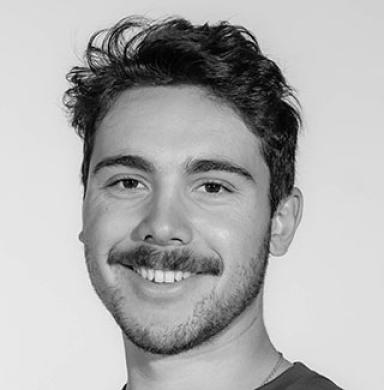Student Film Celebrates Power of Arts, Great Outdoors in Managing Mental Health Challenges
When DU student and emerging filmmaker Jonah Steinberg (BA ’24) noticed the call for proposals for the new Jack Nathan Award in the Arts last spring, he knew he had a movie to make.
The recently created $5,000 award honors the legacy of DU student Jack Nathan, a vibrant member of the university community who championed the power of theatre and visual art in addressing mental health issues, and funds student art projects that do the same.
Steinberg, who transferred to DU from Montana State University after being recruited by the university's ski team, immediately thought of his close friend, former roommate and fellow competitive skier Eli Hermanson. Hermanson has coped with mental health challenges since suffering a traumatic brain injury in high school.
“When I read the award description, I knew this would be a perfect way to tell Eli’s story,” Steinberg said. “Eli has been more vocal about his mental health struggles than most people, especially in a male sporting community where there can definitely be some negative connotations around mental health.”
Steinberg applied for and was granted the award, which was split between him and fellow DU student Hannah Routon, who has written a play and is currently exploring possibilities for its production in the spring.
The funds enabled Steinberg to fly to Hermanson’s home state of Alaska and film him fishing, hiking and running in the wilderness settings that continue to help heal and manage the anxiety that developed following his accident.
Mental Homework, the short documentary Steinberg made about his friend, features Hermanson’s reflections on his continuing recovery.
“My film is about one person’s mental health journey, but the takeaway is how spending time in nature is a fantastic way to work on your mental health,” Steinberg said.
A Media, Film & Journalism Studies major who is minoring in marketing and communications, Steinberg attributes his passion for filmmaking to growing up in Canmore, a small town in Alberta, Canada.
An avid outdoor sports and adventure enthusiast, he became captivated by the possibilities of capturing compelling outdoor narratives on film and took three years off between high school and college to launch a freelance commercial film and photography business.
“I felt that film was a great way to share these stories of adventure and adversity,” Steinberg said.
While experienced in producing documentary-style films for companies through his freelance business, Steinberg had never before used film to tell a more personal, nuanced story. Although he and Hermanson had a lot of pre-film meetings to discuss major points “it was quite a different experience.”
“My commercial work is very straightforward whereas with Eli, we had a general sense of direction but through the interviewing process stories came up that changed how I’d been imagining the film.”
Channeling his skills into “more meaningful work” broadened Steinberg’s understanding and appreciation for filmmaking. As a result, he plans to expand the preplanning process in future documentary projects.
Creating the film also enabled Steinberg to more deeply relate to those who struggle with mental health, an experience he hopes his film likewise offers viewers.
“Making the film allowed me to reflect and be more accepting and understanding of my own and other people’s mental health,” he said. “I’m proud that my film is getting Eli’s message out there and if it makes one person take a turn for the better, then goal achieved.”
Steinberg, who hopes to harness what he’s learned in his DU courses to pursue a career in commercial filmmaking, has entered Mental Homework in a variety of spring film festivals and made the documentary available on his YouTube channel and his professional website.
He remains grateful for the award and the generosity of Jack Nathan’s parents, who made his film possible.
“I’ve gotten close to a few people who were close friends of Jack's and that made the whole experience even more meaningful,” Steinberg said. “I was able to work alongside those individuals while making the film, see how much it meant to them and hear how much Jack would have loved the film.”



